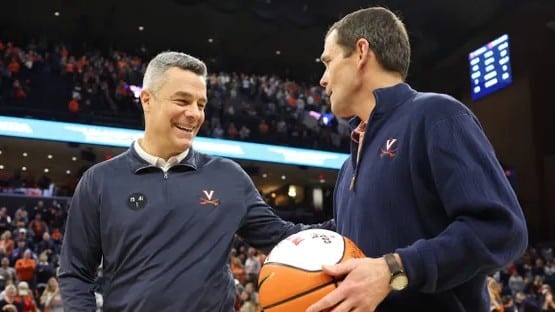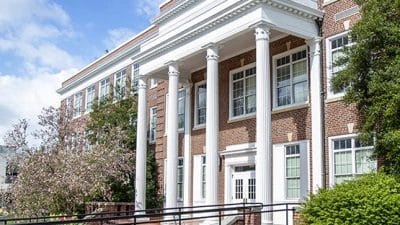Story by Chris Graham
They ask you to open your coat, to let them look inside your bag, to examine your rolled-up stadium blanket, just to be safe.
It’s a nuisance, sure, but after 9/11, who’s going to complain, right?
“I think since 9/11 we’ve become more tolerant of intrusions on our property and person – that we recognize that times have changed, and that we have to give up some of our personal freedoms to ensure security,” said Michael McCann, a professor at the Mississippi College School of Law and a regular contributor to The Sports Law Blog.
That has generally been the case in sports venues across the country in the aftermath of the Sept. 11, 2001, terrorist attacks. But there has been something of a blowback that has gotten going in recent months – with suits filed against stadium authorities in Tampa Bay and San Francisco related to patdown searches of fans attending NFL games in those two cities.
“The immediate legal issue is our Fourth Amendment right to be free from unreasonable searches and seizures,” said Rebecca Steele, the director of the ACLU of Florida’s Tampa office, which is acting on behalf of a Tampa Bay Buccaneers’ season-ticket holder to challenge the patdown-search policy at Raymond James Stadium.
“The law is really pretty clear – that a suspicionless patdown search is presumed unconstitutional unless certain exceptions exist. What we said, and the court agreed, is that those exceptions just don’t exist here,” Steele told The Augusta Free Press.
A state judge issued a preliminary injunction prohibiting Raymond James Stadium officials from conducting the searches. The case is now being heard in federal court – opening up the question of the future of searches at stadiums and arenas nationwide, which have been ramped up with the threat from international terrorists in the forefront of facility managers’ minds.
“There is a fear of there being violence in any kind of a venue that has large numbers of people. And sports has always been one of the areas with the visibility and media attention that’s given that it’s always a logical and potential place for terrorist violence,” said Lynn Jamieson, the chair of the Department of Recreation and Park Administration at Indiana University.
Fans attending sporting events have gotten accustomed to being asked to open their coats and backpacks and purses and the rest – and don’t view the requests as being an inconvenience or of an intrusive nature, Jamieson said.
“I think about the Indianapolis 500 in this context. When you go to that event, people are bringing in cartloads of coolers and different kinds of things. And it does take a while,” Jamieson said. “They’re permitting it, but the surveillance is greater, and people have adjusted by coming earlier, and the facility has adjusted by increasing the number of people checking, and the checking has become more efficient.
“We’ve adapted to having this as a part of the way that we attend events. It hasn’t really deterred people from wanting to continue to attend events. It’s not something that people object to. They tolerate it because they prefer to be safe,” Jamieson told the AFP.
Facility managers, for their part, are constantly trying to tweak their approach to security to make sure that the twin objectives of a positive fan experience and a positive security experience are met, said Colby Jubenville, a sports-management professor at Middle Tennessee State University.
“It starts with looking at what ultimately is the objective from a fan experience, from a safety experience, from a security experience, of our risk-management plan, of our facility-security plan,” Jubenville said.
“We can throw our hands up in the air and say that this is just impossible, that if somebody really wanted to do this, they could park their car close to the stadium, they could smuggle a bomb into the stadium. All of those things are certainly possibilities. But all that being said, the role of management is to set up a system that looks at continuous improvement, that looks at what a quality experience is for the fan, and also looks at how they provide a safe and secure environment,” Jubenville told the AFP.
That said, Jubenville feels that the increased focus on security could still be nothing more than a “dog-and-pony show” in terms of its effectiveness.
“Essentially what the research that is being done right now on this is saying is that there is not a statistically significant difference in how facilities managers prepare in large markets and small markets for potential security issues. What that tells me is we’ve either got one of two problems – either everybody is doing a really bad job, or security is not being taken very seriously,” Jubenville said.
Agreeing with that assessment is security-technology expert Bruce Schneier.
“We all think of the movie scenarios – the kinds of things that we would expect to see in a movie plot. Terrorists sneaking a bomb into the Super Bowl, for example. The problem is, terrorists don’t care. They don’t care whether it’s a football game or an airport or a restaurant or a movie theater. It doesn’t matter to them,” said Schneier, the founder and chief technical officer of the Mountain View, Calif.,-based Counterpane Internet Security and the author of Beyond Fear, an analysis of security measures in the post-9/11 era.
“At best, you’re going to slow them down – if you’re lucky. Because what you see at stadiums is completely ineffective,” Schneier said.
“What they’re doing by stopping you for a couple of seconds and doing a cursory patdown of your upper body doesn’t make any sense as an actual, effective security measure. It’s a feel-good measure, basically. It’s what we call security theater. So what we’re dealing with here is we’re basing our security on movie scenarios and security theater,” Schneier told the AFP.
The danger there, as Steele pointed out, “is that this could potentially make people less safe.”
“If you have a group of people standing in line waiting to be patted down, for example, that creates a more target-rich environment,” Steele said.
“If you look at what happens in the Mideast, typically what they’re worried about is people with suicide bomb vests. And often they explode those in crowded marketplaces, bus-stop lines, places where people are crowded around and waiting on something. It seems like these measures could be counterproductive,” Steele said.
The bigger issue, from a civil-liberties perspective, “is whether or not we’re going to just blindly trade off our freedoms in the name of security on account of fear without any showing that it makes us any safer or that it’s necessary,” Steele said.
Jamieson approaches this issue from a different angle.
“The question that we have to ask is – are we safer?” Jamieson said. “We’re more alert and more aware. The safety mechanisms, I think, have probably reduced the potential of using venues for things other than playing. So I think yes, we are. But I don’t know if we’ve gotten the upper hand on terrorist activity that we can’t quite predict. The unpredictability is probably the whole issue.
“At least we know that these surveillance mechanisms are deterring the potential of it being more escalated than it was. We’re secure in that fact, I think,” Jamieson said.
McCann, for his part, agrees with Steele that “there’s a limit that we don’t want to cross where it gets too invasive.”
“But I think there’s a general consensus that times have changed, and we’ve been more fortunate than anything else that we’ve only had 9/11,” McCann told the AFP.
“Sporting events, perhaps more than any other venue, would appear to be a prime target for a terrorist strike. And one terrorist strike in a stadium could change everything – be it a bomb, be it any type of attack,” McCann said.
“The fact that we haven’t had that type of event is a tribute to the security,” McCann said.
(Published 02-20-06)










